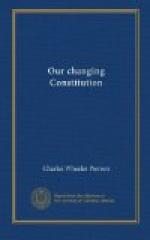Nevertheless, the first period of the Court was by no means barren of achievement. A beginning was made. The supremacy of the national authority under the new Constitution was asserted. So stoutly indeed was it maintained in the memorable case of Chisholm v. Georgia,[1] that the country was thrown into a ferment. The Court had entertained a suit against a sovereign state by a private citizen of another state and rendered a decision in favor of the private citizen. The legislature of the sovereign state concerned (Georgia) responded by a statute denouncing the penalty of death against anyone who should presume to enforce any process upon the judgment within its jurisdiction. The matter was taken up in Congress and resulted in the proposal, and subsequent ratification by the states, of a constitutional amendment designed to prevent such actions in future.[2] It has been the fashion to speak of this incident as a striking example of the recall of judicial decisions. Such indeed it was. The decision did not suit the popular frame of mind and was promptly overruled in the method prescribed by the Constitution. It went a long way, however, toward establishing the Supreme Court as a power to be reckoned with on the side of national supremacy and authority.
[Footnote 1: 2 Dallas, 419, decided in 1793.]
[Footnote 2: Amendment XI.]
Three years later the Court again took occasion to assert the national supremacy in no uncertain fashion. The case was Ware v. Hylton[1] and the Court laid down the proposition that a treaty of the Federal Government (in this case the treaty of peace with Great Britain) nullified previous state laws dealing with the subject matter. It is an interesting circumstance that one of the counsel on the losing side in this case was John Marshall of Virginia, and that this was the only case he ever argued before the tribunal through which he was destined to play so momentous a part in history.
[Footnote 1: 3 Dallas, 199, decided in 1796.]
In the annals of the Supreme Court and the development of American constitutional law the name of John Marshall stands preeminent. He was appointed Chief Justice by President John Adams, and took his seat on the Bench at the beginning of the new century (February 4, 1801). He was without judicial experience, but his record in other fields of activity and his well-known Federalist principles pointed him out as a man to be reckoned with and explain the aversion with which he was viewed by Thomas Jefferson, the incoming President. The breach between the President and the Chief Justice was widened by some of the early decisions of the latter upholding the supremacy of the National Government and the powers of the Supreme Court, notably the famous case of Marbury v. Madison,[1] in which was asserted the power of the Court to declare an act of Congress void as in conflict with the Constitution. Some years elapsed,




